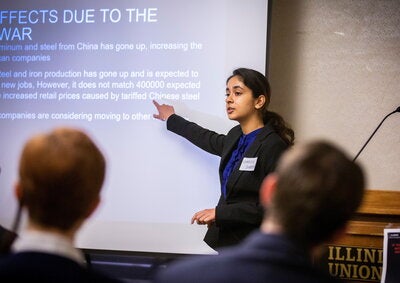
Masters & Undergraduate Research Experience in Statistics (MURES)
The Department of Statistics offers research experience opportunities for both undergraduate and master students who want to work closely with faculty on statistical research projects. These experiences are designed to give students hands-on exposure to research methods, data analysis, and problem-solving in statistics.
Program Overview

Students apply to work on specific research topics led by faculty mentors. Selected students will engage in independent research, meet regularly with their faculty mentor, and present their findings at the end-of-semester Research Symposium.
This is a credit-bearing opportunity and offers an excellent way for students to gain research experience beyond their standard curriculum.
Enrollment and Credit Information
| Program | Course | Credit Hours | Degree Credit |
|---|---|---|---|
| Undergraduate (URES) | STAT 391: Honors Individual Study | 2 | Does not count toward Statistics major requirements |
| Master’s (MRES) | STAT 590: Individual Study and Research | 0–8 (decided with faculty) | Up to 4 credit hours count toward the MS in Statistics degree (not applicable to the MS in Statistics: Analytics track) |
- Both courses are graded and for credit.
- For Master’s students, the general expectation is at least 2 hours of independent work per credit hour per week, with faculty approval required for final credit hours.
Final Project and Symposium
To earn credit, all student researchers must complete a final project presentation, showcased at the Statistics Research Symposium on the last day of instruction (Wednesday, Dec 10, 2025).
- Undergraduate students are also encouraged to submit their work to the campus-wide Undergraduate Research Symposium in April.
- Faculty may assign additional or substitute research deliverables as appropriate for graduate students.
Student Research Experience in Statistics Archives
Eligibility
- URES (Undergraduates):
Open to all Statistics and Statistics & Computer Science majors. - MRES (Master’s students):
Open to MS in Statistics and MS in Statistics: Analytics students who have completed:- STAT 410 (or passed the 410 waiver exam or completed STAT 510)
- STAT 425 (or equivalent coursework)
Selection Process
Faculty mentors will select students based on:
- Application materials
- Academic performance (grades and relevant coursework)
- Research topic interests
- Progress toward degree completion
Application Timeline
Applications for Fall 2025 participation are due by (August 18, 2025, 5:00 PM).
Faculty mentors will notify selected students around the first week of instruction (or the week prior).
Undergraduate Application
Masters Application
Frequently Asked Questions (FAQ)
Can I participate as a new incoming student?
For both undergraduate and master’s students, your first semester can be a busy adjustment period.
- Undergraduate Students (URES):
New freshmen are encouraged to wait until a future semester, as the first term often brings many foundational responsibilities. Transfer students, who already have college experience, are welcome to apply in their first semester. - Master’s Students (MRES):
New master’s students may apply if they have already completed coursework equivalent to STAT 410 and STAT 425 (or similar preparation). Otherwise, participation in later semesters is recommended after completing these foundational courses.
Do I need to apply for URES or MRES to register for individual study courses like STAT 391 or STAT 590?
- Undergraduate Students (URES / STAT 391):
Yes, URES participants enroll in STAT 391 as part of the program. - Master’s Students (MRES / STAT 590):
No, participation in MRES is not required to register for STAT 590. If you already have a faculty mentor willing to supervise your independent study, you may enroll directly in STAT 590 without applying for MRES.
The MRES program is designed to help match interested students with faculty mentors and expand research opportunities for those without an existing research connection.
What are my chances of being selected?
It depends on several factors, including:
- The number of available research topics for the semester
- The total number of applicants
- Your academic preparation and research interests
We recommend that all applicants build their semester schedule as if they won’t participate, but stay flexible in case they are selected and need to adjust their course load.
What if I don’t hear back before the semester starts?
Not hearing back immediately does not always mean you won’t have an opportunity.
For both URES and MRES:
- Faculty may step forward with additional research opportunities shortly before or even during the semester.
- The applicant pool will remain available to faculty throughout the semester.
We encourage students to stay optimistic and responsive to communication from faculty mentors.
Additional questions? Please contact hyoeun@illinois.edu and lbravo@illinois.edu.